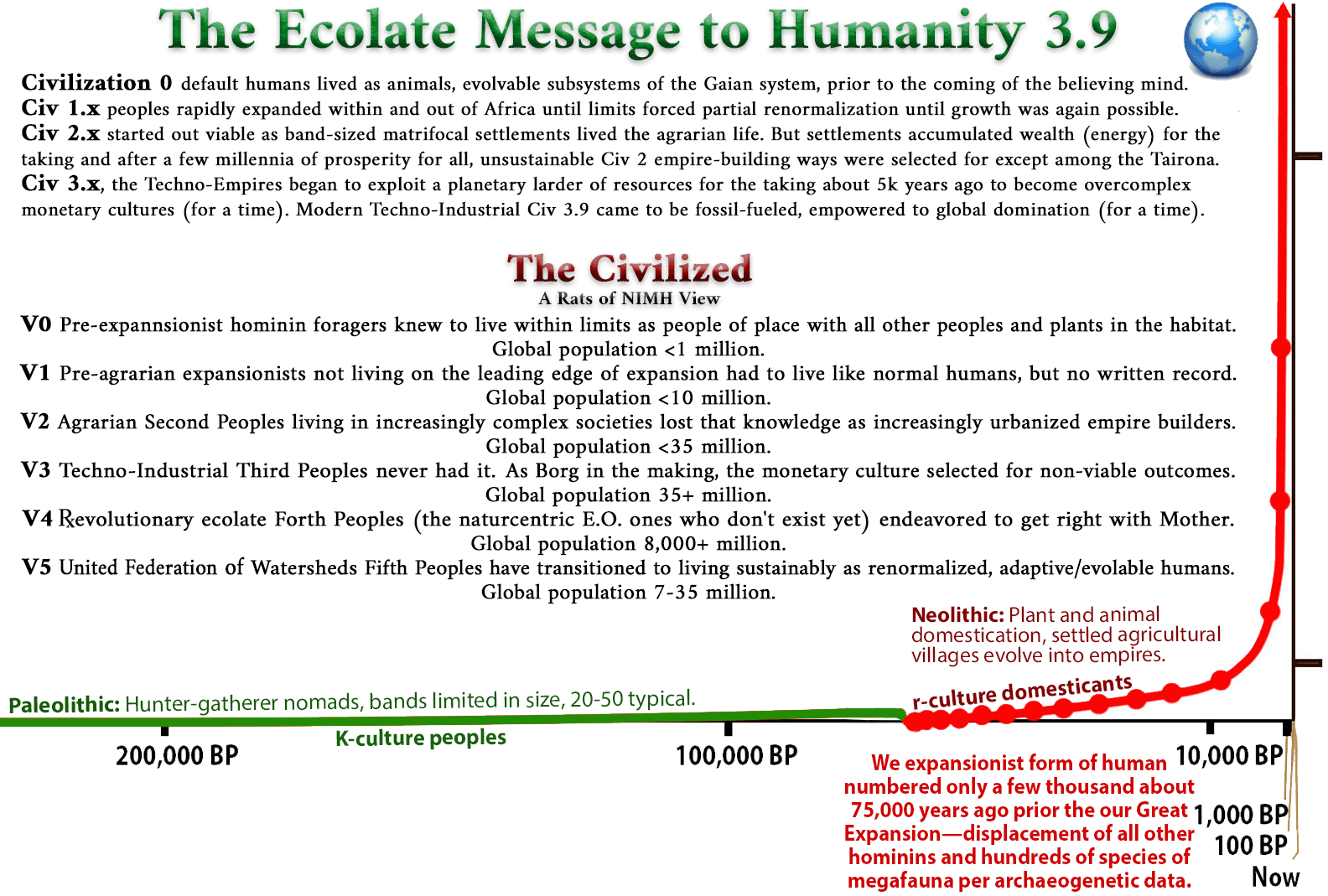
FRIDAY, JULY 28, 2023: NOTE TO FILE

Algorithm of Mind
The bifurcation of which you may or may not be aware
Eric Lee, A-SOCIATED PRESS
TOPICS:PRIMATE, FROM THE WIRES, PRATTLE
Intro: I was hit by a truck, two weeks post-traumatic amnesia, a month in hospital, and my wife recalls that among the first seemingly coherent words I managed to utter was, "what we have here is a bifurcation of which you may or may not be aware." This is what Daniel Dennett's daughter called a "deepity," i.e. meaningless prattle that seems like it has meaning. I vaguely recall saying it, and I still retain the illusion I was saying something meaningful about a fork in futurity's pathway, one being death and the other the possibility of realizing my Buddha nature, aka the true man with no title (in my youth I read a lot of Ch'an literature).
COOS BAY (A-P) — If you remain within your tribal identity group (having a shared language, e.g. English, and worldview, e.g. science, religion, monism, dualism, modernism, postmodernism, conservatism, wokeism, QAnon, antifa…), then when someone (a stranger, but one presumed to maybe share your tribal identity as otherwise you‘d ignore them) speaks (or types), your hominin concept-forming brain will assess whether you Like what they say which decides whether you continue listening (and maybe Share their fine words with other tribal members who will Like them (whether in a tavern, coffee shop, or on social media) and receive social approbation of some sort in return. If you feel compelled to agree, then you may come to learn more about the new-to-you story (e.g. climate catastrophe or climate hoax).
The end point is to be part of a group (a near echo chamber) wherein everyone agrees to agree on the verities. The one belief that all must share, both within your group and between groups having different beliefs (e,g, Zionist, Islamist, racist, wokeist) is a solemn and certain belief in belief, in your right to believe (that there are verities) and (to avoid dead bodies piling up) the right of everyone who stays far enough away from you and your people to believe in their deeply held beliefs, their tribal group’s consensus narrative, and absolute right to stay in their territory (unless possession is disputed).
My conjecture is that normal (functional K-strategist animals living in Nature/Gaia/Aluna adaptively within limits to persist as the millennia pass) sentient beings do not believe in belief, that such is a relatively modern development within one species in the last 6 million years of hominin evolution. Specifically, a belief in belief developed within the last 50k years among an expansionist form of human (r-strategists having an r-culture), who became the last hominin standing, who has displaced 99.999+% of the prior form (K-strategists having a K-culture) of human.
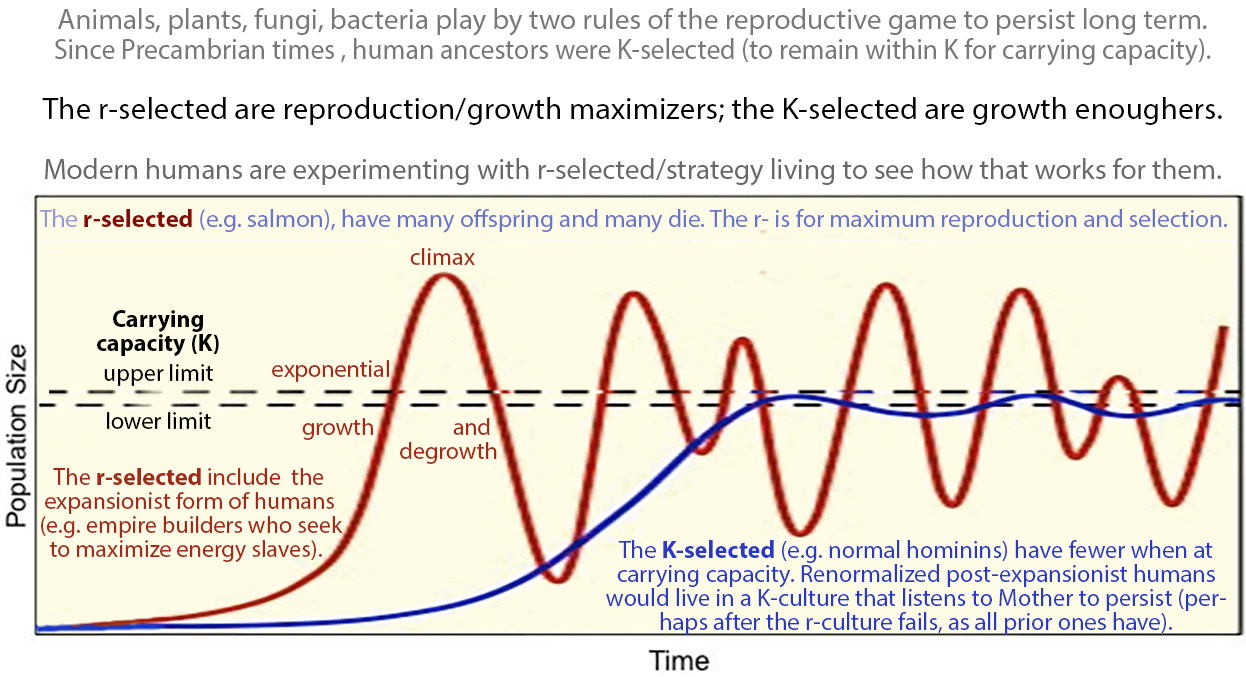
Their condition of belief-based thinking, as it seemed to them, is normal. The abnormal (dysfunctional, non-viable form of cognition) has been normalized. Renormalizing will involve paradigmatic change, and denormalizing the belief in belief norm (and rapidly degrowing our population and contracting our economy) will be required. The 99.9+% will not agree that they have met the enemy, and he is us/them/me/myself/I.

A potentially viable endgame might involve the 0.1% (8 million people) voting with their feet to, by mutual coercion mutually agreed upon, form a potentially viable form of renormalizing civilization (a Civ 4) that could maybe, in as little as 200 to 500 years, create a viable form of civilization that selects for human persistence on a planet where all are watched over by Mothers of loving grace.
If 500k of the 8 million moved to Malta and paid current residents who could not mutually agree to endeavor to become ecolate to move (poor Maltese would be paid 1 million Euros) and live in luxury elsewhere, the country (population 518k) could become ecolate. Could such a population persist? Could 500k ecolate inclined humans, scattered among the 8 billion, persist during chaotic collapse without joining a marauding horde? Could there be a Malta solution?
Current condition: 99.99+% of Anthropocene enthusiasts are incapable of trading in their purpose-driven lives within the global monetary culture to reacquire a life-driven purpose to persist and maybe allow posterity to persist within a biosphere whose condition (health, function) must take priority over any and all human short-term self interests, given that humans can only persist as subsystems of Gaia if they can again love and understand (to live properly with) Mother, giver of life to all the millions of species of Earthlings. Our long-term interests are the same as all other species — to maximize the empower of the world system as empirically measurable in the form of biodiversity so as to systemically manage our form of techno-industrial human.
The supreme commandment shall be: Humans cause no further species extinctions (the Anthropocene ends) nor prevent new species from evolving to replace the anthropogenic loss of biodiversity over the next 10–20 million years of evolution (which will likely involve a managed human population in the 7 to 35 million range, with a near 35 million population enabled if a significant number of humans work as Earth Guardians or Agents of Gaia) . If humans have any measurable effect on planetary systems, it needs to be to increase the rate of the respeciation of life on Earth to mitigate Anthropocene harm.
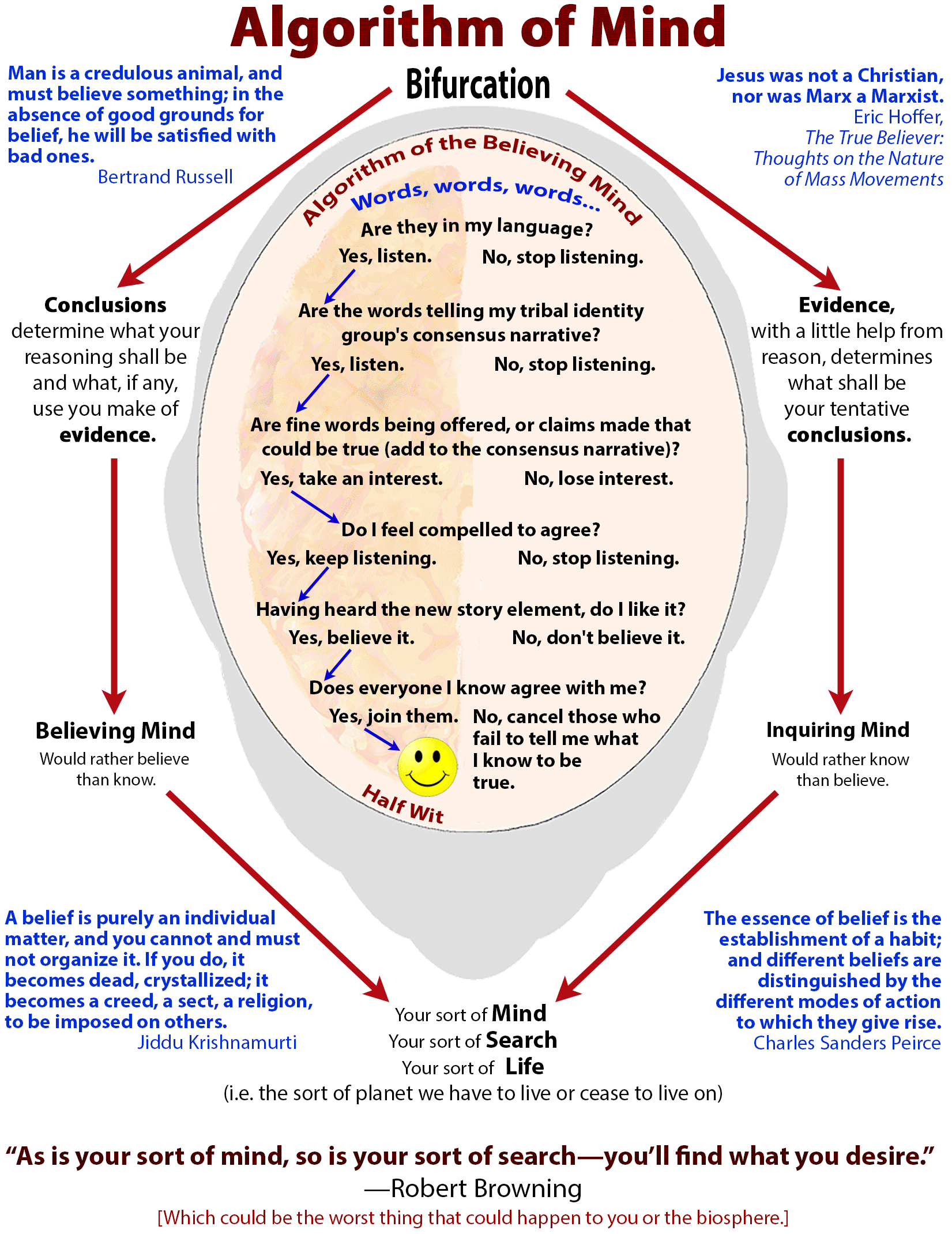
A worldview is not the world, but a constructed story about a putative world, the what’s out there in front of our pug-nosed faces as imagined/asserted.
Worldview stories fragment at each possible bifurcation point. The set of all possible worldviews has an initial bifurcation, followed by fractal-like sub-dividing. The initial divide derives from the definition (concept) of worldview (which could be in error).
Some worldviews endeavor to tell likely stories that meta-reflectively include the story that no story about the world is, could ever be, the world, i.e. no story is real, is true, nor the thing told of, e.g. no climate model (a story) is the climate. Believing that a model, conceptual or cybernetic, is real, is what’s out there, is delusional.
All other worldviews claim to be true, to conflate stories about the world with the what-is, i.e. are belief based, founded on a belief in belief, a mind over reality cognitive pathology (e.g. delusion).
Belief-based worldviews include: modern, postmodern, traditional, religious, ideological, and philosophical stories about the world.
Inquiry-based worldviews, those based on epistemic humility, include: monistic naturalism (and dualistic naturalism, e.g. Stephen J. Gould’s NOMA). All naturalistic worldviews are based on not knowing, on the endeavor to iterate towards knowing, towards telling likely stories. In the absence of true stories, there are (can be) no true stories, merely likely stories, all of which are wrong by degree (e.g. by omission), or “not even wrong.”
“The mind clings to its image of the world, to its narratives of it. We call it real only because of our ignorance…. Do not seek after the truth, merely cease to cherish your opinions [aka beliefs].” — Jianzhi Sengcan (aka Seng-Ts’an, ?-606 CE, Zhen translation)
All naturalistic worldviews are thereby consilient, built on a common epistemic (know-nothings tell no true stories), ontological (all is matter/energy system; not a thing is), axiological (facing the what-is without flinching), ethical (system over self; Earth first; ∴ endeavor to think well, that is the only morality), and governance (rule by choiceless awareness of the nature of things, beings, and systems) basis.
Just as Marx was not a Marxist (true-believing ideologue), Laozi was not a Daoist, nor was Jianzhi Sengcan a Ch’an Master. Neither were humancentric in their worldview as was Marx, unlike the condition of all believing minds, even those who believe in Nature. So an inquiry-based naturalistic worldview is broader than a science-based worldview, but all naturalistic worldviews are naturcentric (and belief-based worldviews are humancentric even if they image/pretend to be naturcentric, e.g. Deep Green Resistance ideologues), another way to restate the initial bifurcation.
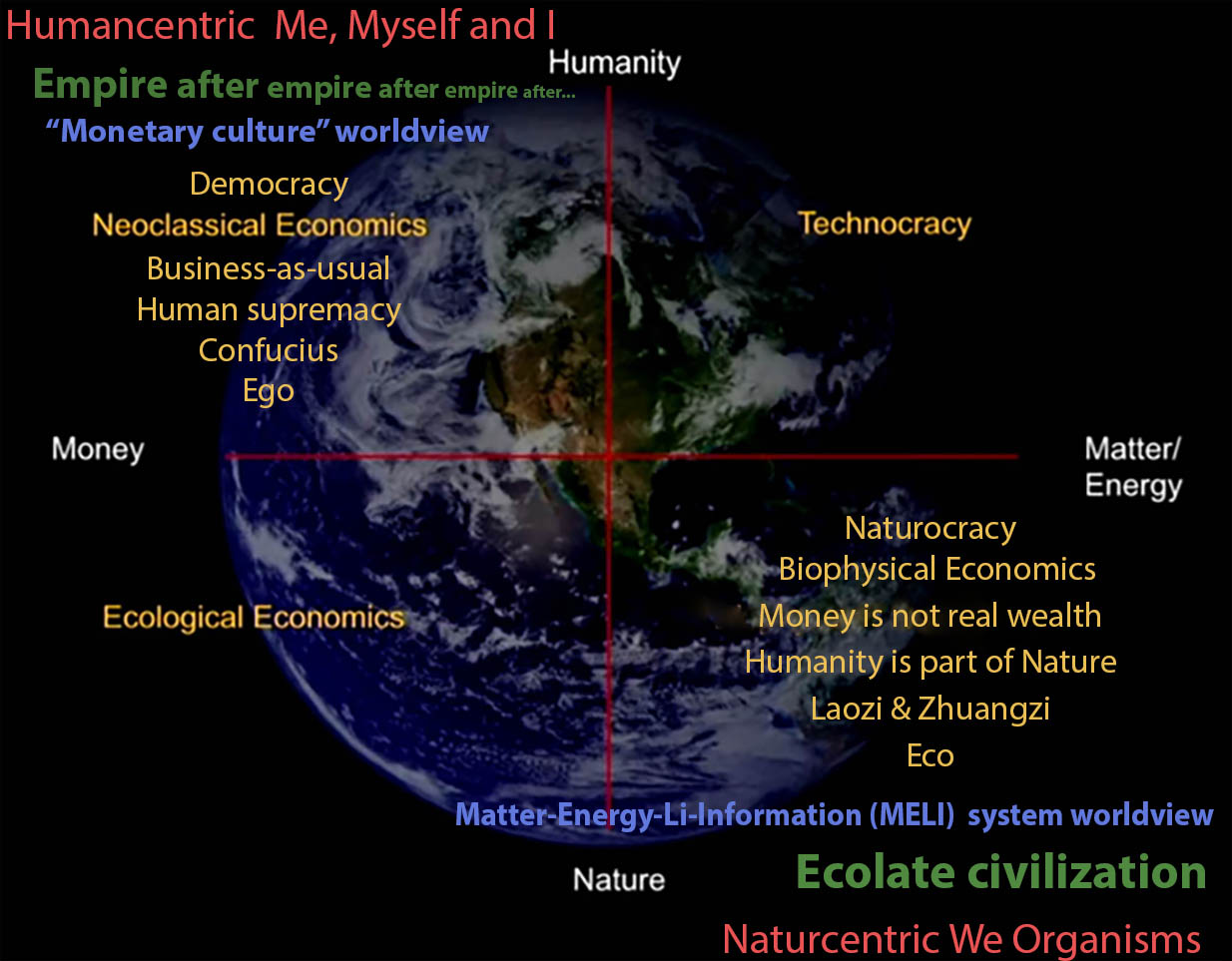
System worldview
From the point of view of all naturalistic worldviews, all belief-based worldviews are “not even wrong” as they end/disable the possibility of inquiry. Free inquiry leads to error, the recognition of which selects for skeptical inquiry within the limits of what works to iterate towards a better view as evidenced by the tea leaves of data (whose interpretation always involves error/uncertainty, which leads to the condition of knowing nothing), celebrated among K-culture humans as the unknown, the mysterious workings of things (systems) more complex than we know or can know.
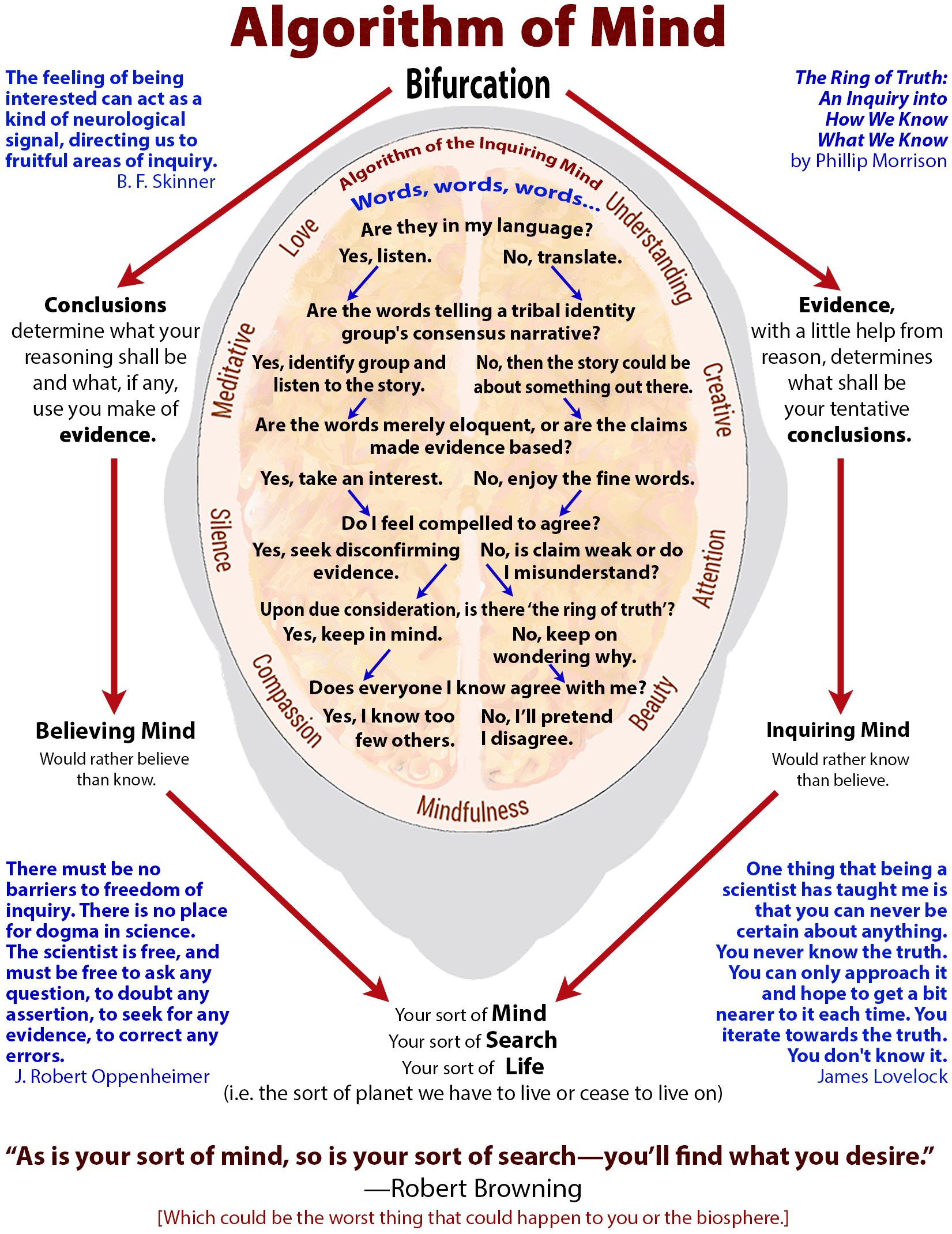
And for another view:
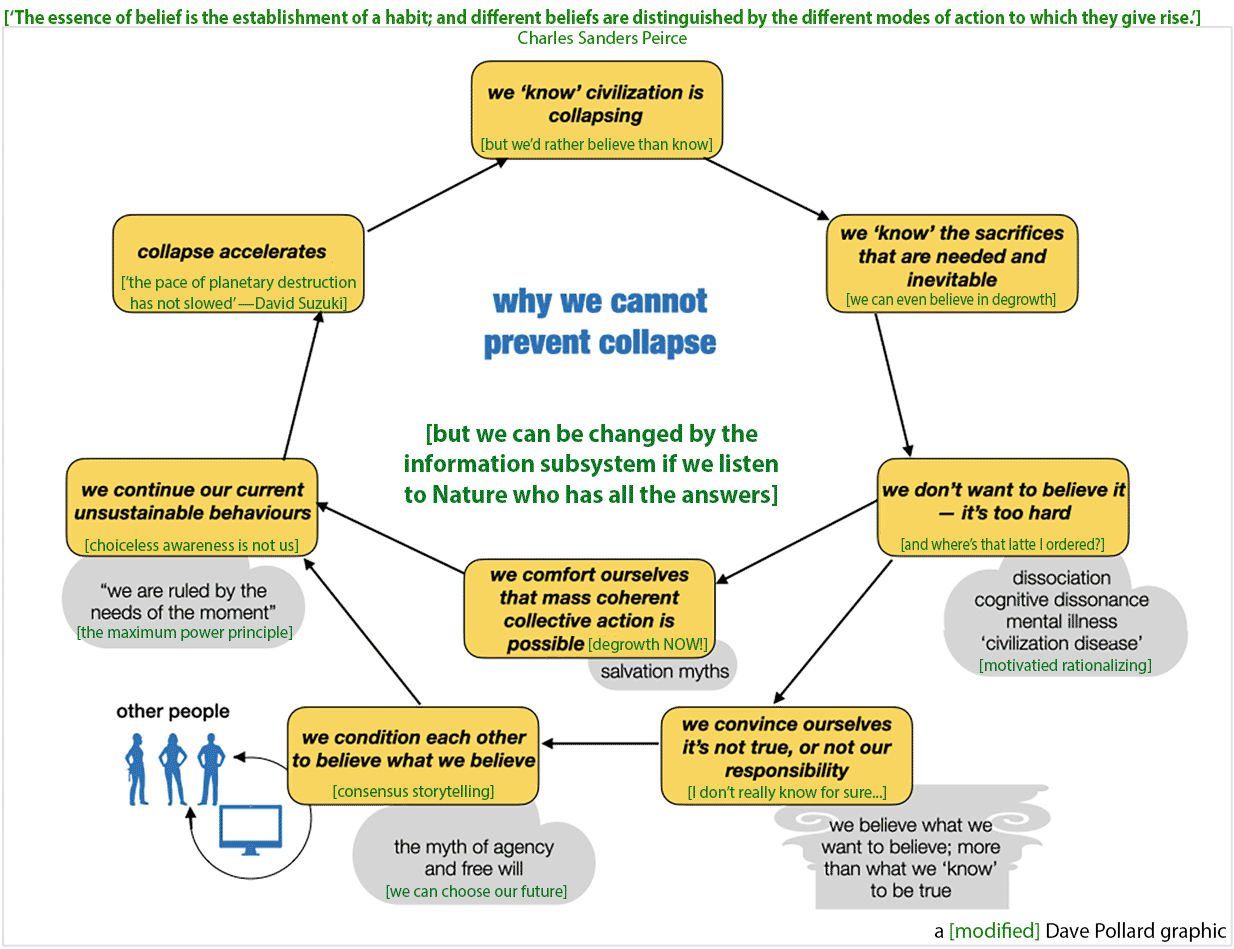
As Peirce notes, a change in beliefs, a form of civilization, culture, worldview, values, assumptions, opinions… changes behavior (not free will, choice, agency). Collapse of a worldview enables its replacement by another, whether crafted by a demagogue to serve short-term self interests, or by system ecologists and systemic managers who listen to Nature who has all the answers about what works to persist (humans don’t get a vote, so down with democracy).

